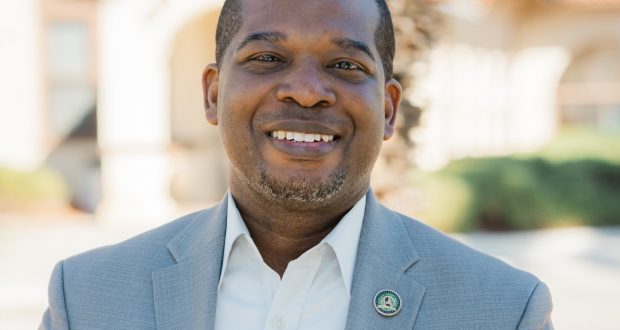This resource was supported in whole or in part by funding provided by the State of California, administered by the California State Library via California Black Media as part of the Stop the Hate program. The program is supported by partnership with the California Department of Social Services and the California Commission on Asian and Pacific Islander American Affairs. To report a hate incident or hate crime and get support, go to https://www.cavshate.org/
By Aldon Thomas Stiles
On July 16, Zócalo Public Square and the University of California, Riverside’s (UCR) College of Humanities, Arts, and Social Sciences hosted a panel titled “How Does the Inland Empire Strike Back Against Hate?”
Moderated by Professor Emeritus of Cal State San Bernardino’s School of Criminal Justice Brian Levin, the conversation centered around the Inland Empire’s history with hate crime as well as the current state of hate in the region.
“In a civil, democratic society, we have to build spaces that actively support strategies to diffuse the underlying elements that give rise to violence and hate crimes,” stated Moira Shourie, executive director of Zo?calo Public Square, on UCR’s events web page. “Our goal with this program is to examine the past, present, and bright future of the Inland Empire’s fight against injustice that local policymakers and advocates in the region are spearheading.”
Assemblymember Corey A. Jackson (D-Riverside), one of the event’s panelists, claimed that there is much work to be done to combat hate in the region.
He also stressed the importance of historical context.
“We are not doing enough in the Inland Empire,” said Jackson. “I think that we have to remember the history of the empire and this rise of hate, only to me, shows me that it’s going back to its roots and we have got to do all that we can to fight against that.”
Near the beginning of the event, organizers played a video of California Attorney General Rob Bonta discussing hate crimes, citing hate crime statistics.
“Between 2022 and 2023, we witnessed a 20% increase in overall hate crimes. Crimes based on race, religion, and sexual orientation,” said Bonta. “Hate against any one of us is hate against all of us. That’s not something we can ever stand for.”
Panelist Luis Nolasco, Senior Policy Advocate and Organizer for ACLU’s Southern California Inland Empire Office, spoke about the immigrant experience in the state and his involvement in projects meant to improve it.
He said that during election years, immigrants tend to be “scapegoats” for the nation’s woes and that the Inland Empire is “no different.”
“I think one of the biggest projects has been ensuring that our localities are implementing policies that are proactive in defending and affecting our immigrant community,” Nolasco said.
Jackson said that one step the Inland Empire can take toward reducing hate crime is to build anti-racist institutions.
He mentioned the Commission on the State of Hate, California’s Civil Rights Department’s commission dedicated to identifying, addressing and preventing hate activity statewide.
“We are making sure that we are upholding what other generations did for us so that when hate, racism and xenophobia raises its ugly head, we’re going to beat it back into the shadows where it belongs,” said Jackson.
Project Director of Mapping Black California and speaker on the panel Candice Mays spoke about reporting hate crimes and how crucial that is for understanding the scope of these types of crimes in the region.
She asserted that citizens need to be made aware of how to report hate crimes and who to report them to, considering that sometimes the perpetrators of hate crimes are those sworn to protect the citizenry from them.
“I think the first hurdle to report a crime is how do you tell the police on the police,” said Mays.
In terms of victimization, Jackson stated that no one is safe from hate crime, saying that “we are all on the menu.”
“As a matter of fact, it is starting to become a buffet when it comes to hate,” he said.
During the event, Inland Valley News inquired of the panel what measures the state can take to improve upon how they respond to reports of hate crimes.
“When instances of hate arise, the Civil Rights department cannot respond to it unless someone calls them and asks them for support,” Jackson said. “So we’re changing the law to say that they can be proactive so that they can begin. And their direction is going to be to send someone into the community, provide them with training, help them build coalitions and the infrastructure to prevent it from happening again or to respond in a better way.”
He went on to emphasize the crucial role lawmakers play in addressing hate.
“The idea is that we have to make sure that we’re eliminating legislative legal barriers, but also unleashing the power of the state to actually be the in the forefront of anti-hate,” he said.
 Westside Story Newspaper – Online The News of The Empire – Sharing the Quest for Excellence
Westside Story Newspaper – Online The News of The Empire – Sharing the Quest for Excellence





